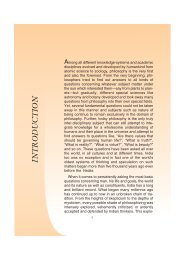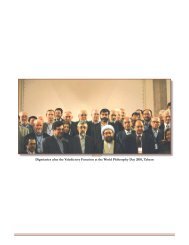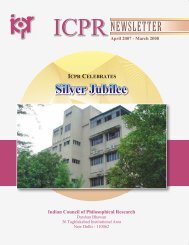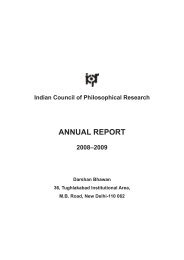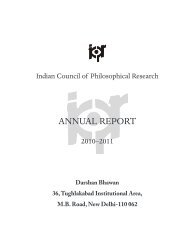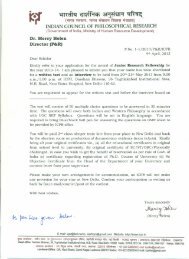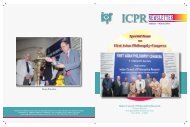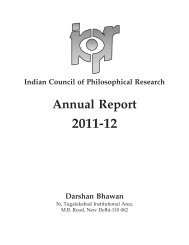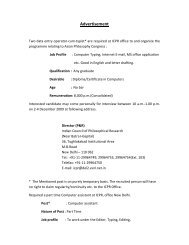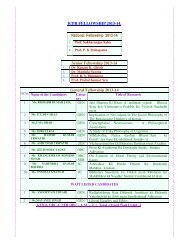ANNOUNCEMENT OF THE WORKSHOP ON ADVAITA VEDANTA ...
ANNOUNCEMENT OF THE WORKSHOP ON ADVAITA VEDANTA ...
ANNOUNCEMENT OF THE WORKSHOP ON ADVAITA VEDANTA ...
You also want an ePaper? Increase the reach of your titles
YUMPU automatically turns print PDFs into web optimized ePapers that Google loves.
<strong>ANNOUNCEMENT</strong> <strong>OF</strong> <strong>THE</strong> <strong>WORKSHOP</strong> <strong>ON</strong> <strong>ADVAITA</strong> <strong>VEDANTA</strong>ICPR is organizing a 10 - day Workshop on Advaita Vedanta from December 20– 29, 2010 under the directorship of Professor R. Balasubramanian at its AcademicCentre, Lucknow.A brief write-up is given belowThe central teaching of Advaita may be summarized in three propositions:(1) Brahman is the sole reality; (2) the jiva in its essential nature is no otherthan Brahman; and (3) the world of plurality is illusory. This teaching isbased on the Upanisads. A systematic presentation of this teaching is inBadarayana’s Brahma-sutra. Sankara who wrote commentaries on theUpanisads and the Brahma-sutra elaborated the Advaita principle.Considering the contribution made by Sankara, the tradition has viewed himas the dividing line and speaks of pre-Sankara Advaita and post-SankaraAdvaita.Four important theories comprising metaphysics, epistemology, andsoteriology of Advaita are to be found in the writings of Sankara and otherAdvaitins. First, it advocates the theory of Nirguna-Brahman inmetaphysics. Brahman which is the sole reality is non-dual not only in thesense that there is no second entity outside it, but also in the sense that it isfree from internal differentiation. In order to explain its relation to theworld, Advaita makes use of the principle of maya. It means that Brahmanwhich is acosmic becomes cosmic and gets related to the world throughmaya. Second, it holds the theory of vivarta, which is both metaphysical andepistemological in character. In the place of Brahma-parinama-vada, itadvocates Brahma-vivarta-vada. Third, Advaita advocates anirvacaniyakhyatifor the explanation of the problem of perceptual error. Thisepistemological theory has its bearing on Advaita metaphysics. Fourth, itholds that the jiva can attain liberation while living, by realizing its essentialnature. What binds the jiva is its ignorance of its real nature. When itsignorance is removed by knowledge, it gets liberated. The concept ofliberation-in-life (jivan-mukti) is unique.Advaita develops its epistemology and metaphysics starting from theempirical world which is pluralistic in character. It holds the view thatwhatever is experienced by us must be accorded some level of reality. Itmeans that from one perspective Advaita is committed to radicalempiricism. It builds its metaphysics from empirical pluralism totranscendental monism.
The jiva plays three different roles in every-day-life — as the knower, as anenjoyer, and as an agent. It is subject to adhyasa in all its activities, secularas well as scriptural. Adhyasa can be overcome by right knowledge.Scholars who are interested in attending the workshop may send their applications withtheir CV to the Director(P&R) , ICPR, Academic Centre, 3/9, Vipul Khand, Gomtinagar ,Lucknow latest by 15 th October 2010. Besides this, they are supposed to fill up the enclosedform also. Applications received after the deadline will not be entertained. Selection will bemade on the basis of the criteria fixed by the Director of the workshop.



